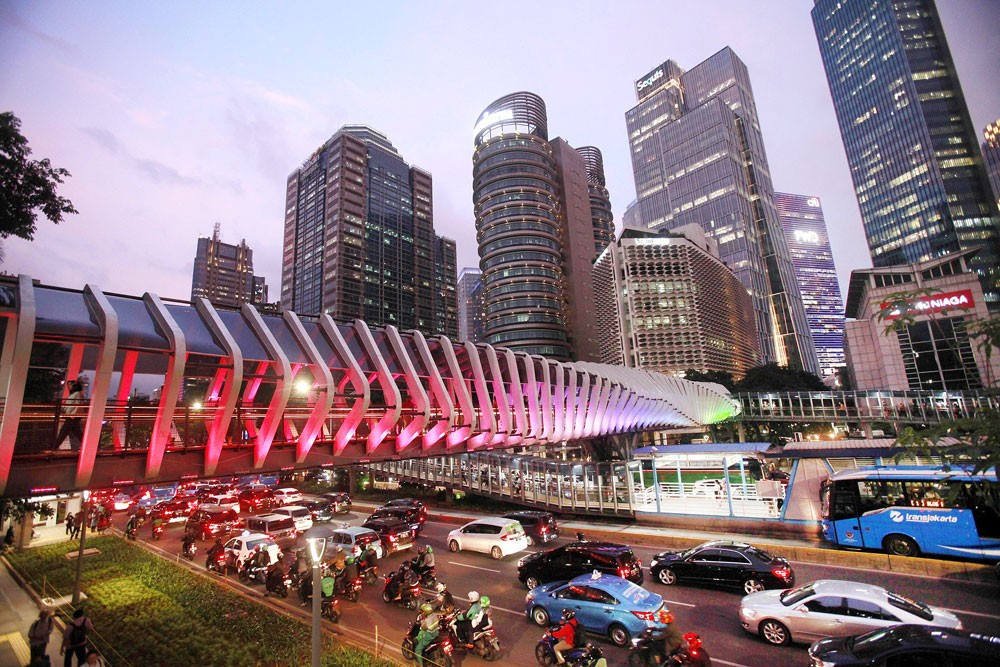News
Manpower Ministry skimming off expats on top of strict laws
Tenggara Strategics June 25, 2025 A pedestrian bridge across Jl. Sudirman in Central Jakarta is bathed in pink light in this file photo. (The Jakarta Post/Iqbal Yuwansyah)
A pedestrian bridge across Jl. Sudirman in Central Jakarta is bathed in pink light in this file photo. (The Jakarta Post/Iqbal Yuwansyah)
Indonesia’s tough laws on companies employing foreigners have been further complicated by alleged embezzlement at a unit of the Manpower Ministry which oversees their administration. An ongoing probe into the scandal, however, may not lead to significant changes as the practice has been taking place for more than a decade.
Moving the administrative process online, according to the investigation by the Corruption Eradication Commission (KPK), has only facilitated bureaucrats in charge to skim off more money from expatriates intending to legally work in Indonesia.
The KPK has named eight ministry officials, including a former director general for the placement of foreign workers, as suspects in its investigation for allegedly collecting Rp 53.7 billion (US$3.3 million) in illegal fees in 2019-2024, but it has since learned that the practice dates as far back as 2012, covering three ministers under three different administrations. It remains to be seen whether the investigation will go all the way back and all the way up to the three different ministers. The eight officials are the main beneficiaries of the scheme, but they also distributed the money to lower-ranking officials, including office boys, within the Directorate for the Control of Foreign Workers. The KPK said they also spent some of the money to pay for lunch at the directorate. The entire unit is seen as part of the scheme.
The KPK is also looking into the role of middlemen who provide “professional services” to help expatriates, or their employers navigate through the application process. A KPK official said it also wants to look into the possible complicit role of some of the hiring companies, naming specifically mining companies, in the scheme.
Going by the modus so far found by the KPK, the scheme is a classic example of the prevalent bureaucratic mentality of “Why make it easy, if you can make it difficult?” when providing public services and make yourself some extra money in the process.
Companies intending employ a foreigner must first apply for the Placement of Foreign Workers Plan, known by its Indonesian acronym RPTKA, before the intending expatriate can apply for the work permit, known as ITAS/KITAS. Assuming they meet all the conditions stipulated in the regulations, they may submit their applications online.
According to the KPK investigation, the middlemen would already know the next steps, which would include paying bribes, for the applications to be processed. Most companies would go this way.
For those refusing to play along, the directorate would sit and wait to be contacted, and once that happened, the applicant would be asked to submit many more documents and given a short time to furnish them or pay hefty penalties for each day of delay. You just can’t beat the system.
This is a neat operation to last this long. Expatriates and their employers are easy prey as they rarely, if ever, publicly complain. Most of them probably do not know that they are paying bribes, and even if they do, they would dismiss them as part of the normal cost of doing business in Indonesia.
Indonesian laws only allow foreign workers with high skills that are not available in the country in order to project jobs for its nationals. Many of these foreign workers must also transfer their skills and knowledge to locals as part of the condition of their work permit. Some also come as part of direct foreign investment projects.
In 2024, there were 184,000 foreign workers registered with the Manpower Ministry. Chinese workers make up for about 54 percent of these, followed by Japanese, South Koreans, Indians, Malaysians and Filipinos.
The heavy representation of Asians as against Westerners in the expatriate community may represent the size of their countries’ investments in Indonesia, but it also reflects that Asian companies or business people are willing to play along more so than Westerners. United States companies, for one, are subject to the tough Foreign Corruption Practices Act at home.
President Prabowo Subianto has vowed to eradicate corruption but his record on this has been patchy since he took charge in October. The KPK has been cherry picking its targets, which appear to be more politically motivated, going not so much after the corruption, but more after selected individuals. Another high-profile investigation is currently looking at the procurement of Chromebook laptops at the Education Ministry.
When the administrative process to get work permits for foreign workers moved online, there was the expectation that the procedures would be improved and more transparent. But the bureaucrats quickly found creative ways to circumvent the system to make extra money. The investigation may lead to the jailing of some officials, even all the way up to the ministers, but this is not likely to be a deterrent without a significant change in the prevailing bureaucratic mentality.
What we've heard
The suspects allegedly exploited licensing loopholes, demanding bribes from companies or agencies seeking permits to employ foreign workers, with applications reportedly stalled until payments were made. A law enforcement official stated, "They were officials who had direct contact with agencies or permit applicants."

